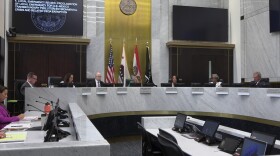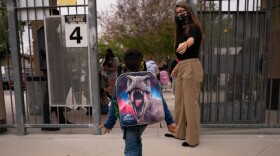When U.S. diplomat Maryum Saifee was based at the U.S. Consulate in Lahore, Pakistan, she oversaw a program that brought together tech entrepreneurs from Austin, Texas, and businesses in Pakistan's Punjab region. The goal: to expand investment and business opportunities in both countries.
"We have mayors and governors already engaging with their overseas counterparts, and they've been doing this for years," Saifee says.
"So in Pakistan, I got to see this firsthand in an action," she explains. "It's increasing investment dollars into Pakistan, but also expanding new markets and business for the folks in Texas. So it's a win-win in terms of the economy, but also the people to people."
Saifee says this type of "subnational diplomacy" should be a priority at the State Department.
She is one of the current State Department employees who contributed to a new report, "Transforming State," from the Truman Center, a think tank in Washington. The report focuses on how to make the department more ethnically diverse, equitable and innovative, while making a case for strong diplomacy to the American public by engaging locally across the country.
The Biden administration has said it wants a foreign policy that delivers to middle-class Americans. Having more connections to cities and states could help with that, according to the authors. Secretary of State Antony Blinken has also promised to make the State Department look more like America, announcing in February that he would appoint a chief diversity and inclusion officer as a first step.
There are diplomats in residence at a handful of universities across the country and Sen. Chris Murphy, D-Conn., is sponsoring legislation to create an office of state and local diplomacy in the department.
"We have a real opportunity to modernize the State Department so the agency can better represent America, both by diversifying the ranks of our diplomatic corps and expanding foreign policymaking outside of Washington to bring mayors, governors and local elected officials into the fold," Murphy said in a statement.
Getting Congress involved is important because the agency doesn't have the kind of constituency that the military has, says Truman Center CEO Jenna Ben-Yehuda. "We can't build an aircraft carrier in every congressional district, but we can put people with ideas around the country." The time is right, she says, "because guess who is talking to China all the time? The L.A. mayor's office. Who works on climate change? Folks at the state [and city] level around the country."
That was increasingly true after the Trump administration left the Paris climate accord. "All the action has been happening in cities for four years. So really, the diplomats who are in these countries need to know that China sends people from the city level to New York and to these cities all the time," says Lolita Jackson, a climate change adviser in the New York City mayor's office.
She's become a sort of local climate diplomat, meeting with environment ministers from half a dozen countries — without guidance from the State Department.
"We just figured it out our own, but it would have been helpful for them to say, hey, you're talking to Ireland's environment minister, you might want to know these other things going on with Ireland. That would have been great."
Kim Olson, a former foreign service officer who contributed to the report, says diplomats could do more to help mayors and governors understand the "lay of the land" in their dealings with foreign officials.
Olson left the State Department in 2014 to start a family and move home to Oregon. She worked for some time in the State Treasury and found that many people didn't even know what the foreign service was.
"Do you mean the Forest Service?" she says people told her. "It became almost a running joke."
Copyright 2021 NPR. To see more, visit https://www.npr.org.






